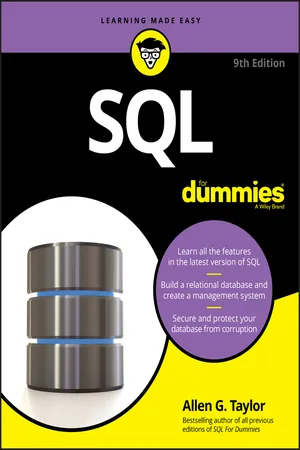SQL For Dummies
About this book
Get ready to make SQL easy!
Updated for the latest version of SQL, the new edition of this perennial bestseller shows programmers and web developers how to use SQL to build relational databases and get valuable information from them. Covering everything you need to know to make working with SQL easier than ever, topics include how to use SQL to structure a DBMS and implement a database design; secure a database; and retrieve information from a database; and much more.
SQL is the international standard database language used to create, access, manipulate, maintain, and store information in relational database management systems (DBMS) such as Access, Oracle, SQL Server, and MySQL. SQL adds powerful data manipulation and retrieval capabilities to conventional languages—and this book shows you how to harness the core element of relational databases with ease.
- Server platform that gives you choices of development languages, data types, on-premises or cloud, and operating systems
- Find great examples on the use of temporal data
- Jump right in—without previous knowledge of database programming or SQL
As database-driven websites continue to grow in popularity—and complexity— SQL For Dummies is the easy-to-understand, go-to resource you need to use it seamlessly.
Tools to learn more effectively

Saving Books

Keyword Search

Annotating Text

Listen to it instead
Information
Getting Started with SQL
Relational Database Fundamentals






Keeping Track of Things
- Storing data must be quick and easy because you’re likely to do it often.
- The storage medium must be reliable. You don’t want to come back later and find some (or all) of your data missing.
- Data retrieval must be quick and easy, regardless of how many items you store.
- You need an easy way to separate the exact information you want now from the tons of data that you don’t want right now.
What Is a Database?
Table of contents
- Cover
- Table of Contents
- Introduction
- Part 1: Getting Started with SQL
- Part 2: Using SQL to Build Databases
- Part 3: Storing and Retrieving Data
- Part 4: Controlling Operations
- Part 5: Taking SQL to the Real World
- Part 6: Advanced Topics
- Part 7: The Parts of Tens
- Appendix: ISO/IEC SQL: 2016 Reserved Words
- Index
- About the Author
- Connect with Dummies
- End User License Agreement
Frequently asked questions
- Essential is ideal for learners and professionals who enjoy exploring a wide range of subjects. Access the Essential Library with 800,000+ trusted titles and best-sellers across business, personal growth, and the humanities. Includes unlimited reading time and Standard Read Aloud voice.
- Complete: Perfect for advanced learners and researchers needing full, unrestricted access. Unlock 1.4M+ books across hundreds of subjects, including academic and specialized titles. The Complete Plan also includes advanced features like Premium Read Aloud and Research Assistant.
Please note we cannot support devices running on iOS 13 and Android 7 or earlier. Learn more about using the app
